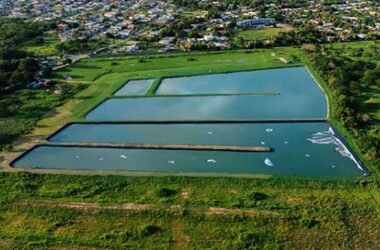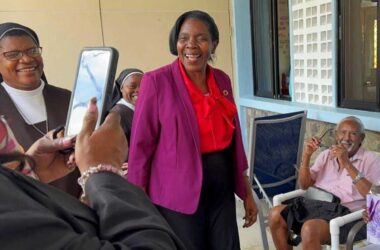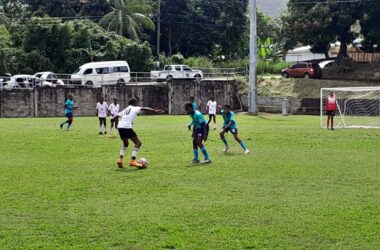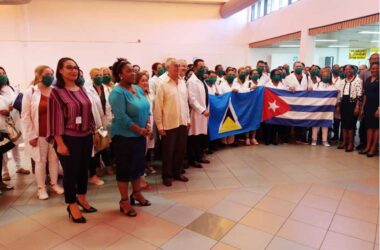
Government authorities and agencies are busy undertaking major infrastructural, social and economic interventions to address the plight of affected citizens – as a result of the November 6 floods in the island’s northern zone that caused extensive damages.
Yesterday, key personnel from various ministries and other stakeholders were in attendance at an ‘Update to the Nation’ press briefing to shed light on the extent of damages incurred and the way forward through adaptation and mitigation processes.
Prime Minister Phillip Pierre stressed the need to be aware of the dangers involved with such floods and the likelihood that these natural disasters will occur more frequently.
“We are going to be getting more floods, worse weather (patterns) and the country will have to mitigate or try its best to mitigate against the issues that relate to these weather conditions,” declared PM Pierre.
However, the prime minister chided the world body for not committing to the guarantee made several years ago, to provide assistance to Small Developing States (SDGs).
“The world body had promised us over $200 billion several years ago to help mitigate against these efforts …and up until now we have not collected a fraction of that money,” he said.
Therefore, said Pierre, the onus is upon these independent nations “with our tight fiscal situation to deal with the issues at hand.”
He said the other challenge involves how the authorities will finance these mitigation efforts, which must be handled on two levels. Level number 1, involves trying to mitigate against these issues and “that means we have to build retaining walls…and structures that can deal with the floods and hurricanes that will come”.
PM Pierre added, “Then we have to adapt to the situation when it arises.”
Additionally, while acknowledging the input of key agencies such as NEMO, WASCO, LUCELEC, the Fire Service , the Police Force and volunteers “that worked tirelessly” to get the work done, the prime minster reproved technocrats for the lengthy ‘bureaucratic delays’ in reaching out to assist with the plight of the many people affected.
He disclosed that Saint Lucia applied to the CDB for a $US5 million loan and a $US300, 000 grant to assist with provision of relief supplies to victims of the November 6 devastating floods that wreaked havoc in the north of the island.
The prime minster complained that with all the regulatory paper work involved to access these funds “people are suffering”.
Said Pierre, “The technocrats must understand that while they are asking for all these papers, people, real people, are suffering.”
He asserted the need for flexibility in cases of emergency so people of this country could get support.
PM Pierre further disclosed that government has made $200,000 available for food and sanitation packages and a grant to the flood-hit Dame Pearlette Louisy Primary School to get students back to school. The Dame Pearlette institution is reportedly the worst affected school on the island following the flood damages.
He also spoke of plans to access a grant to facilitate the replacement of household appliances damaged or lost during the flood, and proposals from the St Lucia Development Bank (SLDB) to offer a special package for householders.
“Climate change is real and it will happen again,” Pierre stressed.
Reiterating the pleas and caution concerning the impact of indiscriminate garbage dumping in the island’s waterways, he declared: “I want to make a plea to Saint Lucians – please stop disposing of garbage in the rivers and waterways of the country. Please!”
Describing the recent deluge as “a tragic incident”, Acting Director at NEMO, Marilyn Medard reported that at least 88 millimeters of rain was recorded during the time of the flooding.
She said this “was something that is not normal for us in these times and even when we’ve had hurricanes, tropical storms etc…we have not had that kind of rain in a short space of time.”
In assessing the damages, Medard noted that there were lots of “big rocks”, and other debris being brought down by the river.
She stressed the importance of adhering to the sanitation policy for ‘bulk garbage disposal’. “Bulk garbage disposal, once a month ensures that we know what day our bulk garbage is being collected and disposed of in the proper manner,” cautioned Medard.
The NEMO official reported that the agency has partially activated its National Emergency Operations Centre (NEOC) “to include the key personnel…and the necessary persons to respond to the flood and the persons who were affected.”
Medard listed several community areas that were affected by the floods including ; Corinth, Grand Riviere, Monchy, Bexon , Marc, Union, Riviere Mitand, Mornier, Bois d’ Orange , Gros Islet , Balata, Hope Estate , Beausejour , and More Du Don.
As of November 12 the NEMO official informed that in excess of $1.2 million in damages have been recorded, initially.
Medard reported that the Dame Pearlette Louisy School suffered damages in the region of $780,000, and the junior students on the ground floor were most adversely affected.
She said three hotels in the north suffered “major damages” and initial assessments looked at 20 businesses, so far “that have suffered damages, floods and persons lost a lot of their equipment and so on.”
On the infrastructural side, she said, the initial damages recorded were in the range of $854, 180, and as well, there were proportional damages to the agricultural sector in excess of $62,000.
Speaking to the Needs Analysis Factor, she said, a comprehensive examination was conducted by the District Disaster Committees, Gros Islet Town Council, Ministry of Housing, St Lucia Cadet Corps, and the Damage Analysis and Needs Assessment Team.
Said Medard: “What they found is that persons have lost almost 90% of their households, and their livelihoods. Most persons have had to throw away almost everything.
“Some people are still trying to grab on to the hope that they can still recover some of their items.”









![Amy Stephen [Photo credit: Community Tourism Agency]](https://thevoiceslu.com/wp-content/uploads/2026/01/Amy-Stephen-feat-380x250.jpg)



